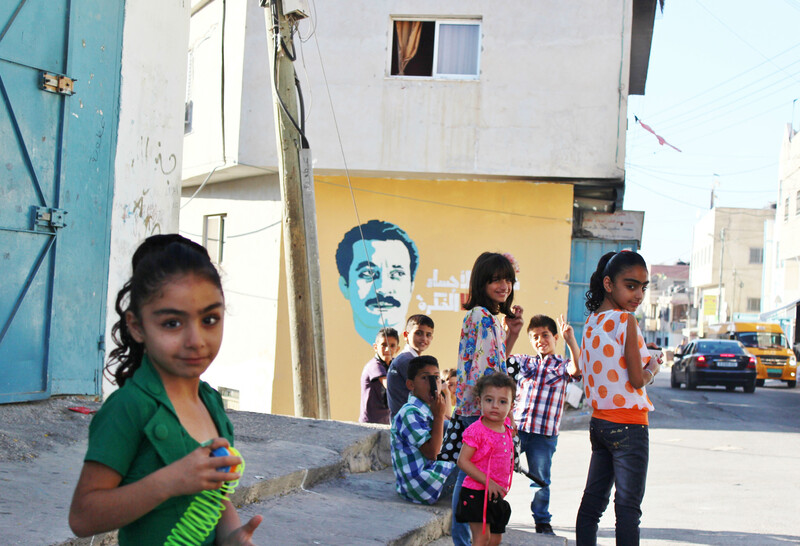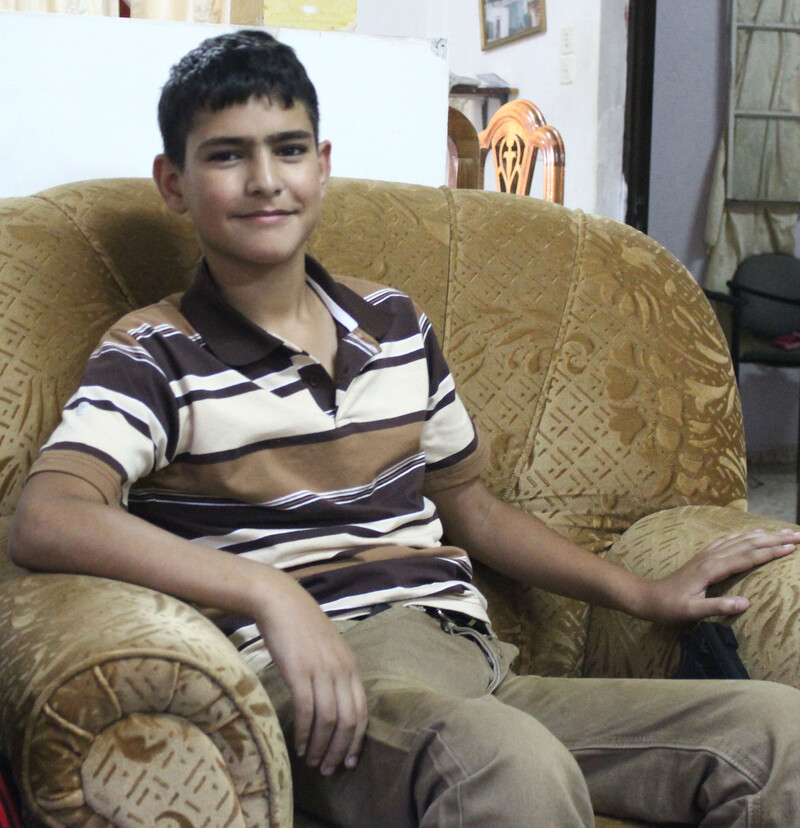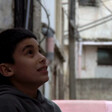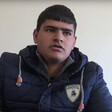The Electronic Intifada Chicago 3 October 2013

Palestinian children in Jalazone refugee camp.
Against the backdrop of concrete barriers, illegal settlements and the constant presence of violent Israeli soldiers, Palestinian children are introduced to catastrophe early on.
They quickly become familiar with moments that divide life into the times before and after trauma. The two have very little in common. Where once there was a sense of calm, there is now an overwhelming sense of shock and disorientation.
Violent experiences replay in their minds over and over. The stress that trauma inflicts on the body and mind corrodes attachments to other people.
Every place, sound and scent leaves an imprint inscribed in memory like irreversible negatives from cameras. Everything in their surroundings becomes imbued with terror. It’s an assassination of innocence.
Ask a Palestinian child living in a refugee camp that has seen one too many nightly raids by Israeli forces or one living in a flashpoint city where clashes and provocations are frequent. They can tell you this story better than anyone, because Palestinian children have been the victims of slow, calculated erasure for decades now.
Shattered security

Atta Sabbah, 13, is paralyzed after an Israeli soldier shot him in the spine.
Since the outbreak of the second Palestinian intifada 13 years ago, Israeli forces have killed 1,398 children, according to Defence for Children International - Palestine Section. Approximately 8,000 children have also been detained and prosecuted, and often injured and tortured, in the Israeli military detention system during the same time period.
Every morning that 13-year-old Atta Sabah wakes up, he is reminded of the fact that he is now among the growing number of children whose blood continues to be spilled by Israel.
On 21 May this year, Atta wasn’t throwing stones. He wasn’t involved in clashes or provocations with soldiers. Atta committed no known crime.
He completed his final exam and went to retrieve a school bag that had been taken from him by a soldier the day before. On his way to the Jalazone Boys School, he stopped by a small corner shop to buy a soda. He opened the can, saw two soldiers hiding behind a wall, and turned around to run away.
One of the soldiers aimed a machine gun and fired a single bullet, changing his life forever. A bullet severed Atta’s spinal cord and he fell to the ground. The bullet ravaged tissues and caused irreparable damage to his spleen, pancreas and liver, and left him with multiple fractured ribs.
Atta is a harmless child who used to spend his free time tending to his pigeons. Every day now — as he tries to maneuver his way through the narrow, uneven streets of the refugee camp — Atta is reminded of his new reality.
Gunshots as normal
When I first met Atta and his mother, Itimad, at the Reuth Rehabilitation Center in Tel Aviv in June, I met a child whose voice was barely audible above a whisper and a mother whose heartbreak was heard in every syllable she spoke.
On the last day of my recent trip to Palestine — 10 August — I stopped to say goodbye to Atta and his family at the Jalazone refugee camp. As I drove past the Bet El settlement outside of Ramallah towards the camp, all of the details from the testimonies came into focus and became personal.
Climbing the stairs to the apartment in the crowded camp, I caught sight of a wheelchair in the corner and felt a chill down to the marrow of my bones.
Muhammad, Atta’s father, carried his son into the living room. Atta’s legs dangled limply over his father’s arms. Tears streaming down his face, Muhammad told me that three of his sons had been shot by the Israeli military with complete impunity. Atta’s older brother Ala had been shot in his leg and arrested just a few months prior to Atta being shot. Ala found out about Atta’s condition while languishing in an Israeli prison.
“Ever since people heard about what happened to Atta, children here don’t go out as often to play. They’re afraid they could be next,” said Fatima, Atta’s aunt.
“But that’s exactly what Israel wants. They want them to fear going out and living their lives — but they’re wrong,” she added with fierce defiance as she looked at Atta.
Numbing illusion
Like countless others before him, the soldier who shot Atta received not so much as a slap on the wrist for the irreparable damage he caused, according to the family’s attorney. Adding insult to injury, it was the Palestinian Authority which paid for Atta’s medical treatment and rehabilitation costs, not Israel.
Under a numbing illusion of power and control, the PA continues to concede the lands, dignity and rights of the Palestinian people.
By footing the bill for Israel’s crimes, the PA wantonly discards justice and the rule of law, replacing them with impunity.
Before I left Jalazone, Atta’s mother repeated a statement that haunted me the last time she said it in Tel Aviv: “Atta is not the first child Israel has done this to, and he won’t be the last.”
Sure enough, she was right. On 24 February, 15-year-old Odai Saleh from the Aida refugee camp in Bethlehem became another one of Israel’s victims. Odai lives with a rubber-coated steel bullet lodged in his head.
On 29 August, four boys aged 16 and 17 were injured during a night raid on the Qalandiya refugee camp outside of Ramallah. And on 31 August, Kareem Abu Sabeeh, 17, was shot and killed by Israeli forces during a night raid on the Jenin refugee camp.
Since January 2013, at least thirty children have been shot and injured, including three who were killed, by live ammunition, rubber-coated steel bullets or tear gas canisters, according to Defence for Children International - Palestine Section.
Defiance
Palestinian children like Atta struggle for the most basic rights of childhood: to be safe, secure and protected. They are denied these rights every day as Israel hides behind its impunity and commits its relentless human rights violations.
Leaving the refugee camp, I saw a group of children standing in the middle of the street sharing sweets and celebrating Eid. Undeterred by fear or intimidation, they flew their new kites and claimed their rights to be children in a world that insists on doing everything to steal that from them.
With fury, hope and an unquenched defiance, they laugh in the face of helplessness and resist against Goliath-like forces in the most basic ways.
Before leaving, I asked Atta what his dreams were for the future. With a quiet but indomitable voice, he said he wanted to become a doctor and a writer to help others who face the same obstacles.
In Palestine, it’s difficult to escape the daily reminders of trauma. But survivors like Atta represent the strongest possible threat to soldiers and political leaders with their courage, determination and resilience.
Editor’s note: an earlier version of this article stated that Atta Sabah was shot by a “dum dum” or exploding bullet but it it is not conclusive that this is the case. The article has since been corrected to remove reference to the type of bullet the boy was shot with. It has also been corrected so the spelling of the boy’s family name is consistent with how it has previously appeared on The Electronic Intifada.
Dina Elmuti is a social worker researching the impacts of chronic traumatic stress and violence on the physical, mental and psychosocial health of children in Chicago and Palestine.





